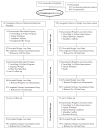Effect of weight loss on urinary incontinence in overweight and obese women: results at 12 and 18 months
- PMID: 20643425
- PMCID: PMC3038435
- DOI: 10.1016/j.juro.2010.05.031
Effect of weight loss on urinary incontinence in overweight and obese women: results at 12 and 18 months
Abstract
Purpose: Initial weight loss improves urinary incontinence in overweight and obese women. In this study we examined the longer term effects of a weight loss intervention on urinary incontinence.
Materials and methods: Overweight and obese women (mean +/- SD age 53 +/- 10 years) with 10 or more urinary incontinence episodes weekly were randomized to an 18-month behavioral weight loss intervention (226) or control group (112). Outcome measures were collected at 12 and 18 months.
Results: At baseline women had a mean body mass index of 36 +/- 6 kg/m(2) and reported a mean of 24 +/- 18 incontinence episodes weekly. Of the patients 86% completed 18-month measurements. The percent weight loss in the intervention group averaged 8.0%, 7.5% and 5.5% at 6, 12 and 18 months, respectively, vs approximately 1.5% in the control group (all values p <0.001). Compared with controls at 12 months the intervention group reported a greater percent reduction in weekly stress urinary incontinence episodes (65% vs 47%, p <0.001), and a greater proportion achieved at least a 70% decrease in weekly total and stress urinary incontinence episodes. At 18 months a greater proportion of women in the weight loss intervention group had more than 70% improvement in urge incontinence episodes but there were no significant differences between the groups for stress or total urinary incontinence. The intervention group also reported greater satisfaction with changes in urinary incontinence than the control group at 6, 12 and 18 months.
Conclusions: Weight loss intervention reduced the frequency of stress incontinence episodes through 12 months and improved patient satisfaction with changes in incontinence through 18 months. Improving weight loss maintenance may provide longer term benefits for urinary incontinence.
Trial registration: ClinicalTrials.gov NCT00091988.
2010 American Urological Association Education and Research, Inc. Published by Elsevier Inc. All rights reserved.
Comment in
-
Behavioral interventions for incontinence and other urinary symptoms: more than pelvic muscle exercises.J Urol. 2010 Sep;184(3):827-8. doi: 10.1016/j.juro.2010.06.054. J Urol. 2010. PMID: 20643436 No abstract available.
References
-
- Melville JL, Katon W, Delaney K, et al. Urinary incontinence in US women: a population-based study. Arch Intern Med. 2005;165:537. - PubMed
-
- Thom DH, Brown JS. Reproductive and hormonal risk factors for urinary incontinence in later life: a review of the clinical and epidemiologic literature. J Am Geriatr Soc. 1998;46:1411. - PubMed
-
- Grimby A, Milsom I, Molander U, et al. The influence of urinary incontinence on the quality of life of elderly women. Age Ageing. 1993;22:82. - PubMed
-
- Hunskaar S, Vinsnes A. The quality of life in women with urinary incontinence as measured by the sickness impact profile. J Am Geriatr Soc. 1991;39:378. - PubMed


